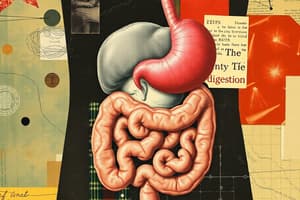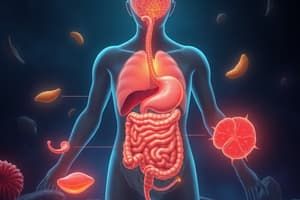Podcast
Questions and Answers
Flashcards
Mechanical Digestion
Mechanical Digestion
The physical breakdown of food into smaller pieces. This involves processes like chewing, grinding, and mixing.
Mastication
Mastication
The process of chewing food with your teeth. It involves tearing, cutting, and grinding food into smaller pieces.
Insalivation
Insalivation
Mixing saliva with ground-up food in your mouth. This creates a bolus, a soft ball of food.
Deglutition
Deglutition
Signup and view all the flashcards
Chemical Digestion
Chemical Digestion
Signup and view all the flashcards
Chyme
Chyme
Signup and view all the flashcards
Chyle
Chyle
Signup and view all the flashcards
Small Intestine Absorption
Small Intestine Absorption
Signup and view all the flashcards
Intestinal Villi
Intestinal Villi
Signup and view all the flashcards
Microvilli
Microvilli
Signup and view all the flashcards
Study Notes
Mechanical Digestion
- Reduces food particle size for easier travel through the digestive system
- Stages:
- Mastication: Tearing, cutting, chewing, and grinding food by teeth and jaw movement
- Insalivation: Mixing ground-up food with saliva by tongue movement, forming a bolus
- Deglutition: Using peristaltic movements to move the bolus through the pharynx and esophagus to the stomach
Chemical Digestion
- Transforms food into nutrients via digestive juices
- Locations:
- Mouth: Saliva acts on carbohydrates, breaking them into simpler substances during bolus formation
- Stomach: Stomach walls secrete gastric juices (with pepsin) acting on proteins, producing chyme
- Small Intestine: Intestinal juices, bile, and pancreatic juices complete chemical transformation of chyme into chyle (containing water, nutrients, and undigested products)
Absorption in the Small Intestine
- Quick nutrient absorption due to large surface area (approximately 200 m²)
- Features increasing surface area:
- Length: ~7-8 meters
- Intestinal folds, villi (thousands covering the intestinal wall), and microvilli (tiny folds on villi cells)
- Extensive network of blood vessels and capillaries within the villi
Absorption in the Large Intestine
- Absorbs most remaining water and minerals
- Greater diameter (approximately 1 meter) than the small intestine, lacking villi
- Gut flora transforms undigested products into feces, expelled via the anus (egestion or defecation)
- Contains indigestible substances like fiber that cannot be broken down into glucose by digestive enzymes.
Studying That Suits You
Use AI to generate personalized quizzes and flashcards to suit your learning preferences.




